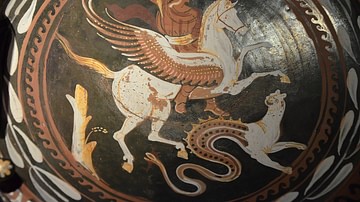Search Definitions
Browse Content (p. 133)

Definition
Osman I
Osman I, also known as Osman Gazi (c. 1258 - c. 1323 CE), was the founder and first Sultan of the Ottoman Beylik, which would rise to eventually become the Ottoman Empire. He was the ruler of a small Turkic principality among many in the...

Definition
Henry VII of England
Henry VII of England ruled as king from 1485 to 1509 CE. Henry, representing the Lancaster cause during the Wars of the Roses (1455-1487 CE), defeated and killed his predecessor the Yorkist king Richard III of England (r. 1483-1485 CE) at...

Definition
Owen Tudor
Owen Tudor, aka Owain ap Maredudd ap Tudor (c. 1400-1461 CE), was a Welsh courtier who secretly married Catherine of Valois (l. 1401 - c. 1437 CE), the former wife of Henry V of England (r. 1413-1422 CE) and mother of Henry VI of England...

Definition
Oyo Empire
The Oyo Empire flourished from the 17th to 19th century CE in what is today southwest Nigeria. The Oyo forged an empire thanks to their formidable cavalry units and so came to dominate other Yoruba peoples of the region. The Oyo Empire, with...

Definition
Kingdom of Luba
The Kingdom of Luba, located in central Africa, thrived from the 15th to 19th century CE and was the first such state in the Congo basin. Skills in ironworking and trade along the Lualaba river in such metals as copper permitted the Luba...

Definition
Electra by Euripides
Electra is a Greek tragedy written by the playwright Euripides, c. 420 BCE. It retells the classic myth concerning the plotting of Electra and her brother Orestes to kill their mother and her lover. This version of the story should not be...

Definition
Bellerophon
Bellerophon (aka Bellerophontes) is the Corinthian hero of Greek mythology who famously battled and killed the fantastical Chimera monster, a fearsome fire-breathing mix of lion, goat, and snake. Bellerophon was the son of Poseidon and he...

Definition
Abbasid Dynasty
The Abbasids were an Arabic dynasty that initially ruled over most of the Islamic empire (save some western parts) after assuming the caliphate in 750 CE, later on, their empire fragmented, however, they retained spiritual supremacy as caliphs...

Definition
Battle of Cannae
The Battle of Cannae (2 August 216 BCE) was the decisive victory of the Carthaginian army over Roman forces at Cannae, southeast Italy, during the Second Punic War (218-202 BCE). The Carthaginian general Hannibal Barca (l. 247-183 BCE), who...

Definition
Orpheus
Orpheus is a figure from ancient Greek mythology, most famous for his virtuoso ability in playing the lyre or kithara. His music could charm the wild animals of the forest, and even streams would pause and trees bend a little closer to hear...